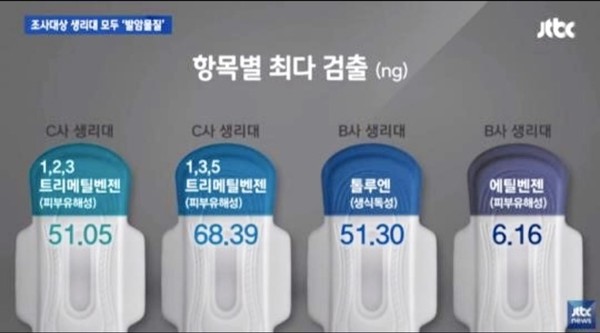In September, Congressman Lee Yong-ho announced that carcinogens were detected in 97.2% of sanitary pads in circulation. This was the result of a 2017 investigation conducted by the Ministry of Food and Drug Safety (MFDS). Despite the age of this report, his comments forced this discussion back into the spotlight. The 2017 MFDS study led to an evaluation of the consequences of carcinogens in menstrual pads and it was concluded there were no ill effects, despite the presence of known toxins. With the Congressman highlighting just how many products are impacted, consumers have once again raised new concerns about their safety.
The study shows that 20 of 137 sanitary products labeled organic, contained 14.6% of benzene, a class 1 carcinogen. This means that contrary to popular belief, organic sanitary products are not free from the dangerous substances.
 |
| ▲ Disposable sanitary pad carcinogens detection data. (Photo from JTBC) |
Out of the 97.1% of carcinogens found in sanitary pads, class 1 carcinogens accounted for 24.8% and reproductive toxins accounted for 95.9%. 98.4% of average disposable sanitary pads tested had traces of the toxic substances, and 99.4% of disposable pantyliners showed the same. 71.1% of reusable sanitary products made of cotton also showed signed of carcinogens. The data shows that almost every type of product available contains carcinogens. The MFDS investigated sanitary products in circulation including tampons, panty liners, sanitary pads for phthalates last year and determined that phthalate and dioxane were detected in 73 of 126 sanitary products. Phthalate is an endocrine-disrupting chemical and class 1 carcinogen. It disturbs the endocrine system and causes attention-deficit/hyperactivity disorder (ADHD). Dioxane is a class 1 carcinogen judged by the International Agency for Research of Cancer (IARC).
According to the MFDS, 359 sanitary products on the market were quality tested for tint and formaldehyde and they concluded that all products were safe. They also monitored the effects of Volatile Organic Compounds (VOCs) in 330 sanitary products on the market. They measured the level of exposure volume of dioxins and VOCs to the entire body, for women using 7.5 sanitary pads per day per day, 7 days a month. Their tests found the skin absorption rate was not enough to harm the human body.
 |
| ▲ Sanitary pad toxicant test data. (Photo from MDFS) |
This is not enough to assuage the fears of some women. Dankook student Kim said, “I was so shocked when I first heard the news. I was disappointed, especially at the fact that there were even carcinogens in organic ones.” She added, “I heard that the biggest problem is a component of the adhesive on the two wings. So, I thought the best way to be safe from those toxic substances is to wear fabric ones that don't have side flaps at all. I tried them for a month but eventually returned to my former style.” She said, “Using fabric pads costs a lot of money and time because I need to clean them to reuse them. Also, we can only buy them in online shopping malls. They are hard to find at convenience stores or supermarkets near my home. They are so inconvenient. When I asked my friends if they used them, many of them said they had not bothered for the same reasons.” She also said, “The Korean Food Drug Administration has repeated that the number of toxic ingredients and additives detected in the products is so small that it wouldn't harm our bodies, but I don’t believe them. Sanitary pads come in direct contact with a sensitive area of our body and women wear them for a week, every month, from their teens to their 50s. I feel like these harmful substances must accumulate in our bodies over the years. I hope girls will be able to buy safer pads as soon as possible.”
Due to the announcement made by congressman Lee, the last safety tests conducted for sanitary pads are being re-examined. According to the congressman, we need to be more suspicious of the MFDS’s opinion and they need to share more significant data to ease the concerns of consumers. Even though the MFDS has already concluded the detection amount of carcinogens in sanitary products was not harmful to our health, consumers are no longer confident in these results. Calls for more expansive, and transparent tests are now being made.
The current controversial data being raised is from a 2017 government report by the MFDS, so consumers need to consider the reports of it carefully. It is nothing new, but it resurfaced to instill fear in consumers and raise the profile of the politicians involved. This issue is no doubt provocative and there is no doubt that we need to reduce chemicals in our products to protect our health and nature. We use a lot of chemicals in all our everyday products. This controversy has heightened our sensitivities to the need to pay attention to what we are using and reduce our exposure to harmful substances, wherever possible.
정예지, 박소현, 김서연 dankookherald@gmail.com

![[Campus Magnifier] Let's Surf the Library!](/news/photo/202404/12496_1765_4143.jpg) [Campus Magnifier] Let's Surf the Library!
[Campus Magnifier] Let's Surf the Library!
![[Campus Magnifier] Let's Surf the Library!](/news/thumbnail/202404/12496_1765_4143_v150.jpg)





